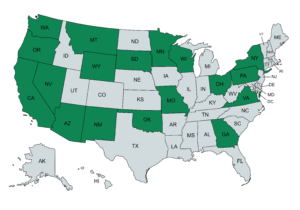A Whole New You: Name changes and identity updates for survivors of domestic violence
Leaving an abusive relationship is the start of a new life. And, sometimes, that new life comes with a new identity in order to remain safe. This article will discuss two important elements of establishing a new identity: the name change and obtaining a new social security number.
Name Change
 A court-ordered name change is obtained by petitioning the court in the county in which you reside. This is generally approved, unless the court believes that the name change is intended to defraud creditors. If everything is in order the court will issue an order authorizing you to start using the requested name.
A court-ordered name change is obtained by petitioning the court in the county in which you reside. This is generally approved, unless the court believes that the name change is intended to defraud creditors. If everything is in order the court will issue an order authorizing you to start using the requested name.
Paradoxically, many jurisdictions require a public notification, generally in a newspaper, of the name change. The purpose is to ensure creditors are aware of the name change and have the opportunity to pursue the debts against the new name. However, requiring publication of a name change can also alert a stalker or abusive ex-partner to the new identity.
It’s important to understand the laws in your state when pursuing a legal name change. Whenever possible, seek legal aid or qualified legal assistance if there’s any concern about your safety or legal options.
18 states allow sealed name changes for victims of crime, to include survivors of domestic violence when there is a reasonable concern for safety. Those states are:
- Arizona [Ariz. Rev. Stat. Ann. §§ 12-601]

- California [Cal. Civ. Proc. Code §§1275-1279.6]
- Georgia [GA Code § 19-12-1 (2020))]
- Minnesota, only for applicants in a witness and victim protection program [Minn. Stat. Ann. §§ 259.10-259.13]
- Missouri [Mo. Ann. Stat. § 527.290]
- Montana [Mont. Code Ann. §§ 27-31-201]
- Nevada [NV Rev Stat § 41.280 (2020)]
- New Mexico [NM Stat § 40-8-2 (2020)]
- New York [New York Civil Rights Law section 64-a(2)]
- Ohio Ohio [Rev. Code Ann. § 2717.11 (2021)]
- Oklahoma [(12 OK Stat § 12-1633 (2020)]
- Oregon, for participants in the state Address Confidentiality Program [ORS 192.826]
- Pennsylvania [54 Pa. Cons. Stat. Ann. §§ 701-705]
- South Dakota [S.D. Codified Laws §§ 21-37-5.2]
- Virginia [Va. Code Ann. § 8.01-217]
- Washington [Wash. Rev. Code Ann. § 4.24.130]
- Wisconsin [Wis. Stat. Ann. § 985.07]
- Wyoming [Wyo. Stat. Ann. §§ 1-25-103]
These states will, when certain conditions are met, seal all records of the name change
28 States either don’t require publication of name changes or allow waiver of the publication requirement. However, these states do not currently have a mechanism for sealing name changes even when a risk exists.
- Alabama
- Alaska
- Arkansas
- Colorado
- Connecticut
- DC
- Florida
- Illinois
- Iowa
- Kansas (in Kansas, there is no requirement unless directed by the court)
- Kentucky
- Louisiana
- Maine
- Maryland
- Massachusetts
- Michigan
- Mississippi
- New Hampshire (in New Hampshire, there is no requirement unless directed by the court)
- New Jersey
- North Carolina
- North Dakota
- Oregon
- South Carolina
- Tennessee
- Texas
- Utah
- Vermont
- West Virginia
There are only five states that will not waive publication requirements and do not seal name change records:
- Delaware
- Idaho
- Indiana
- Nebraska
- Rhode Island (varies by location)
If there is a safety or security concern, it may be worth exploring other options after establishing (even temporary) residency in a different state.
Social Security Number
Another important piece of staying safe and secure after a name change is changing your social security number, if you meet the requirements to get a new number. This will help prevent a stalker or former partner from potentially running a credit report and obtaining potentially sensitive information about your location.
 Until relatively recently, the Social Security Administration (SSA) would not issue a new number unless there was evidence that the number itself had been misused. Fortunately, this is no longer necessary in cases of harassment or abuse.
Until relatively recently, the Social Security Administration (SSA) would not issue a new number unless there was evidence that the number itself had been misused. Fortunately, this is no longer necessary in cases of harassment or abuse.
From the SSA fact sheet (https://www.ssa.gov/pressoffice/domestic_fact.html): “The SSA joins with other Federal agencies to provide greater assistance to victims of domestic violence. Some victims seeking to elude their abuser and reduce the risk of further violence choose to establish a new identity.”
Applications for a new social security number must be made in person at any social security office. Bring evidence of your age, identity (to include both old and new names), and citizenship status. If new numbers are being requested for your children, bring court documentation showing that you have custody. The SSA will require evidence documenting the harassment or abuse. From the fact sheet: “The Social Security Administration will assist you in obtaining any additional corroborating evidence, if needed. The best evidence comes from third parties, such as police, medical facilities or doctors and describes the nature and extent of the domestic violence. Other evidence might include court restraining orders, letters from shelters, letters from family members, friends, counselors, or others with knowledge of the domestic violence.”
Address Confidentiality Program
All states have some form of Address Confidentiality Program (ACP), although the specifics will vary from one state to another. These programs provide a state-owned mailing address that is separate from your physical address, allowing you to use that address for things such as utilities, voter registration, driver’s licenses, and more. Any mail you receive at that address will be forwarded to your address of choice, but the forwarding information is not available to the public.
This is, of course, most helpful for after you’ve already moved. Using a confidential address will help prevent your address from showing up in online “people searches” and being otherwise discoverable.
Your local courthouse, advocate, or attorney can help you figure out what options are available to you.
Conclusion
Increasingly, federal, state, and local governments recognize the challenges faced by survivors of domestic violence and other crimes. By understanding the laws in your area, you can take steps to keep yourself safe and start your new life.
